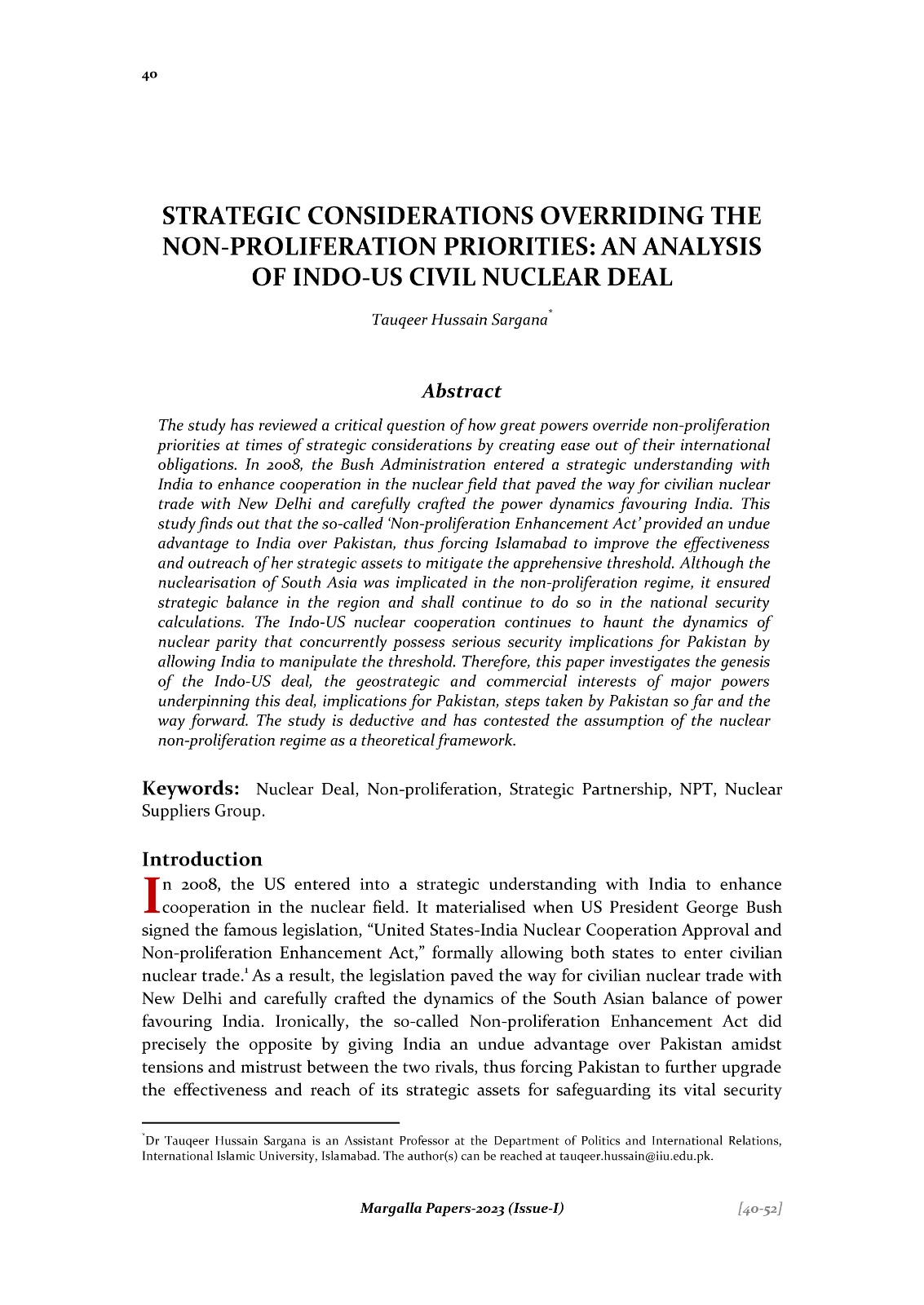STRATEGIC CONSIDERATIONS OVERRIDING THE NON-PROLIFERATION PRIORITIES: AN ANALYSIS OF INDO-US CIVIL NUCLEAR DEAL
DOI:
https://doi.org/10.54690/margallapapers.27.1.150Keywords:
Nuclear Deal, Non-proliferation, Strategic Partnership, NPT, Nuclear Suppliers Group.Abstract
The study has reviewed a critical question of how great powers override non-proliferation priorities at times of strategic considerations by creating ease out of their international obligations. In 2008, the Bush Administration entered a strategic understanding with India to enhance cooperation in the nuclear field that paved the way for civilian nuclear trade with New Delhi and carefully crafted the power dynamics favouring India. This study finds out that the so-called ‘Non-proliferation Enhancement Act’ provided an undue advantage to India over Pakistan, thus forcing Islamabad to improve the effectiveness and outreach of her strategic assets to mitigate the apprehensive threshold. Although the nuclearisation of South Asia was implicated in the non-proliferation regime, it ensured strategic balance in the region and shall continue to do so in the national security calculations. The Indo-US nuclear cooperation continues to haunt the dynamics of nuclear parity that concurrently possess serious security implications for Pakistan by allowing India to manipulate the threshold. Therefore, this paper investigates the genesis of the Indo-US deal, the geostrategic and commercial interests of major powers underpinning this deal, implications for Pakistan, steps taken by Pakistan so far and the way forward. The study is deductive and has contested the assumption of the nuclear non-proliferation regime as a theoretical framework.
Bibliography Entry
Sargana, Tauqeer Hussain. 2023. "Strategic Considerations Overriding the Non-Proliferation Priorities: An Analysis of Indo-US Civil Nuclear Deal." Margalla Papers 27 (1): 40-52.
References
Monika Barthwal-Datta, "Constructing India as a Similar Enough Other: The Bush Administration's Strategic Narrative of the US-India Civil Nuclear Cooperation Agreement," Journal of Global Security Studies 6, no. 1 (2021): 71. DOI: https://doi.org/10.1093/jogss/ogz071
David Moschella and Robert D. Atkinson, India Is an Essential Counterweight to China—and the Next Great US Dependency. Information Technology and Innovation Foundation, 2021.
Muhammad Murad, Muhammad Ramzan Kolachi and Uroosa Ishfaq, "Nuclear Suppliers Group (NSG) membership: The case of India and Pakistan," Global Political Review 3, no. II (2019): 31-39. DOI: https://doi.org/10.31703/gpr.2018(III-II).04
Pulkit Mohan and Pallav Agarwal, "India’s civil nuclear agreements: A new dimension in India’s global diplomacy," ORF Issue Brief 320 (2019): 2.
Khurram Maqsood Ahmad, "The Evolution of Indian Nuclear Policy," Institute of Regional Studies, Islamabad 36, no. 1 (2018): 89-107.
Shaista Tabassum, "Indo-US Nuclear Relations: An Appraisal," Pakistan Horizon 73, no. 3-4 (2020): 15-28.
Ahmad Ali, Javeria Noor Sawal and Noor Fatima, "Indo-US Civilian Nuclear Deal: Challenges and Options for Pakistan," Liberal Arts and Social Sciences International Journal (LASSIJ) 6, no. 1 (2022): 109-127. DOI: https://doi.org/10.47264/idea.lassij/6.1.8
Ravi B Grover, "Opening up of International Civil Nuclear Cooperation with India and Related Developments," Progress in Nuclear Energy 101 (2017): 160-167. DOI: https://doi.org/10.1016/j.pnucene.2016.09.016

Downloads
Published
How to Cite
Issue
Section
License
Copyright (c) 2023 Tauqeer Hussain Sargana

This work is licensed under a Creative Commons Attribution-NonCommercial 4.0 International License.












